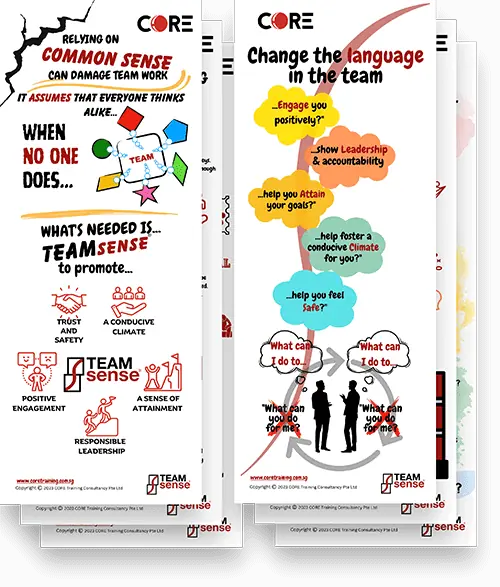When exploring the question, “Why do some employees repeatedly encounter the same challenges despite undergoing in soft-skills training?” it’s crucial to first investigate the underlying root causes.
These are the elephants in the room that, when overlooked, foster negative conditions, attitudes, and behaviours. I will highlight five key soft skills and analyse the possible reasons why employees might still find it difficult to apply what they learned, even after attending training workshops.
Communication Skills
The issue of “communication” frequently arises in our interactions with clients, (which I find ironic given the myriad communication methods and tools available today). So it is not the inability to communicate effectively. One reason could be a lack of awareness regarding individual preferred communication styles. Some like communication to be short and sharp and to the point, others may want lots of detailed information; some are loud and extroverted and others are not. Instead of focusing solely on tools and methods, consider this-that it’s the past experiences, entrenched habits and lack of understanding one another’s preferences that are contributing to the problem.
Trust is essential, especially when project deadlines are tight. Effective communication is crucial for reducing errors and misunderstandings that can lead to conflict. When communication is clear and concise, collaboration improves, resulting in higher productivity. This process relies on every team member being trustworthy enough to share all necessary information without omitting any important details.
In this context, send your teams to workshops that can help them examine, explore and address the team dynamics to help them understand their personal interactions and build trusting relationships with one another..
Problem-Solving Skills
When consulting with clients, I often ask, “Why do you think this is a skills-related issue?” After all, haven’t we all successfully navigated various challenges at different points in our lives? Don’t most of us already possess the necessary skills to tackle problems? So, what might be obstructing the team’s ability to resolve work-related issues may not be as straightforward as a lack of skills.
Explore deeper and you might find excessive micromanagement or insufficient empowerment within the team as the contributing factors. Employees may hesitate to make decisions that could solve problems if they fear making mistakes and facing the consequences.
Find ways to foster an environment where team members feel empowered rather than overly controlled. Seek out training providers that offer workshops centred on empowerment, or consider hiring consultants who can explore the issue more deeply and help create a tailored solution for your organization.
Alternatively, your staff may benefit from coaching aimed at managing their fears and enhancing their sense of empowerment. If the issue is specific to a department, it might be the leader or manager who requires coaching instead.
Time Management Skills
Yes managing time well can significantly enhance workflow and productivity. However, besides skills, other factors may also affect employees, leading to ineffective time management. For example, if team members struggle with procrastination or are reluctant to delegate, training alone may not be enough.
Procrastination often stems from fears of failure, perfectionism, or feelings of being overwhelmed by their responsibilities. Additional underlying issues may include employees taking on too many commitments or setting unrealistic goals, combined with a reluctance or inability to delegate tasks.
When individuals take on excessive responsibilities, they may find their capacity stretched thin, making it difficult to manage time and prioritise tasks effectively. This overload can lead to burnout, characterised by emotional and physical exhaustion, which further impairs decision-making and focus, complicating time management even more.
An important yet often overlooked aspect is knowledge, experience, and capability. Certain tasks require a higher level of expertise and understanding. Inexperienced or unqualified staff may struggle to fulfil their responsibilities, leading to delays or inefficiencies in the workflow. It could be a case of matching abilities and skill. In this case what is needed are technical or some hard skills training instead.
Creativity Skills
Every individual possesses a distinct form of creativity shaped by their unique experiences and intellect. When employees hesitate to share their creative thoughts or solutions—even after participating in “creative thinking workshops”—it is essential to ask, “Why?”
They may withhold their ideas for fear of rejection or criticism. They may worry that their contributions will not be accepted or, worse, that they will face harsh judgment from colleagues or supervisors. This fear is particularly pronounced in workplaces that lack psychological safety, where open communication is not encouraged. Consequently, employees may opt for silence, refraining from contributing to avoid potential embarrassment or negative repercussions.
Additionally, a perceived lack of value or recognition can significantly deter an employee’s willingness to share creative insights. If employees feel that their suggestions are routinely overlooked or dismissed, they may conclude that sharing ideas is futile. In organisational cultures that prioritise established processes over innovative thinking, employees may increasingly recognise that their creative efforts are unlikely to lead to meaningful change.
Another critical factor is the limitation of time and resources. Your, employees may feel overwhelmed by their current workload and may believe they lack the time or support required to develop new ideas. The pressure to meet deadlines can confine them exclusively on completing assigned tasks, leaving little room for creative thinking or problem-solving.
To cultivate a culture of creativity and innovation organisations must first address the underlying challenges by implement policies that support creativity and innovation. Foster an environment where ideas are welcomed, valued, and nurtured, organisations and then leverage on skills training to create a more dynamic and innovative workplace.
Teambuilding Activities
Cultivating a cohesive team atmosphere is essential for the overall success of any organization. The benefits of teamwork and collaboration are clear.
Some clients adopt a rah-rah approach towards team-building workshops’. One day of engaging, relaxing activities and ‘high-fives’ cannot and will resolve issues related to collaboration and cooperation. Despite the advantages, various factors can impede collaboration, which teams must proactively address.
A lack of a clear vision and mission within a team can lead to significant challenges that greatly impede its effectiveness and overall performance. One major consequence of not having a well-defined vision or mission is the resulting absence of direction and focus. When team members lack a clear understanding of the overarching goals and objectives that guide their work, confusion and misalignment frequently arise. Consequently, these individuals may find themselves working in isolation, unaware of how their contributions fit into the larger picture. This disconnect can diminish motivation, productivity, and engagement, as they toil without a cohesive framework to steer their efforts. Simply holding a team-bonding workshop will not suffice to address this issue.
Another obstacle teams encounter is the presence of conflicting personalities and work styles. Team members often come from diverse backgrounds, each bringing different approaches and methodologies. While this diversity can spark creativity, it can also lead to conflict if not managed effectively. Cultural and societal differences can create tension and impede collaboration. Team members who struggle to find common ground may retreat from engaging with their peers and form cliques. A workshop aimed at helping members understand each other’s cultures and personalities could be a beneficial solution.
In many organisations, departments tend to operate independently, even when their functions overlap, often prioritising their own KPIs and goals over shared objectives. When teams concentrate solely on their specific tasks without considering the broader context, they may overlook opportunities for collaboration. This can lead to inefficient resource allocation and create a disconnect among various segments of the organization.
While team bonding activities provide an enjoyable respite from routine tasks, it is important to remember that ‘Monday always arrives’. Unless we make a concerted effort to address the underlying issues, the ‘elephants in the room’, challenges related to communication, creativity, time management, and collaboration will persist once the workweek begins. Although training may offer some assistance, meaningful results can only be achieved by confronting these challenges directly and proactively.



